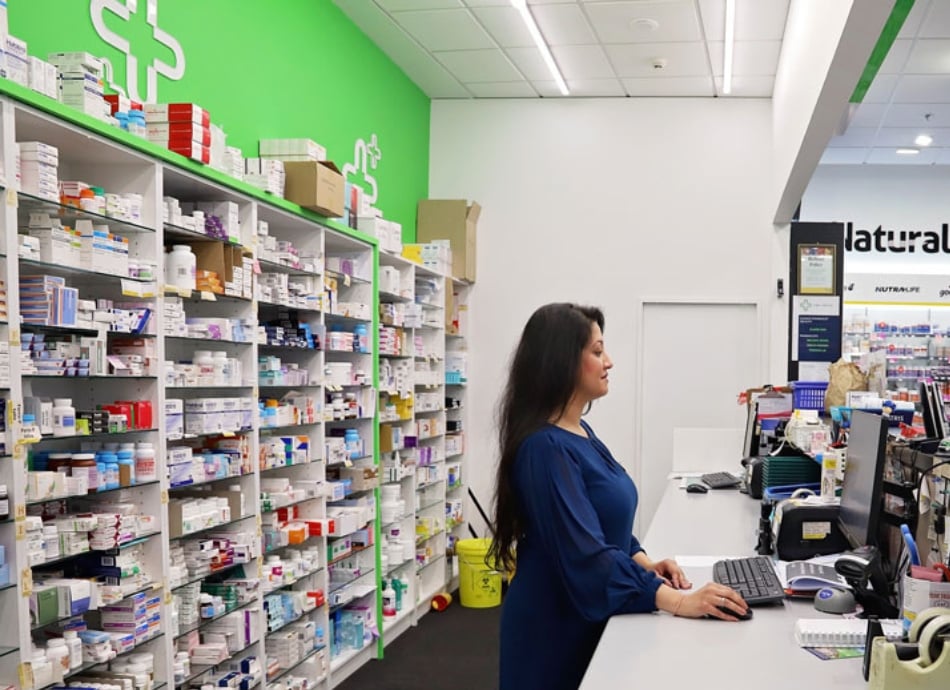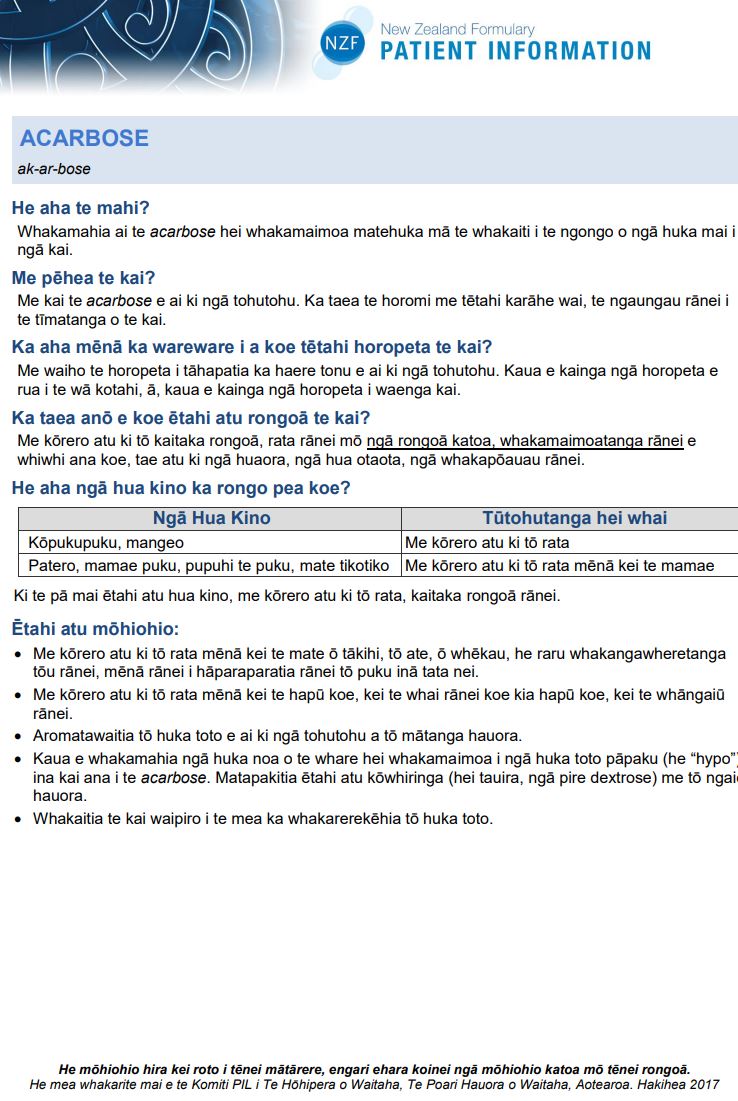Acarbose
Sounds like 'ak-ar-bose'
Key points about acarbose
- Acarbose is used to treat type 2 diabetes.
- Acarbose is also called Accarb®.
- Find out how to take it safely and possible side effects.

Acarbose is used to treat type 2 diabetes, together with exercise, good nutrition, weight loss and other lifestyle measures. It may be used alone or with other medicines for diabetes.
Acarbose works by slowing the digestion and absorption of carbohydrates (sugars) in food you eat. This makes your blood glucose levels rise slowly when eating a meal.
To work properly acarbose must be taken with the first mouthfuls of food at the start of a meal.
Read more about type 2 diabetes and medicines for type 2 diabetes.
In Aotearoa New Zealand acarbose is available as tablets (50 mg and 100 mg).
- The starting dose of acarbose is 50 mg, 3 times a day.
- Depending on your blood glucose level, your healthcare provider may increase your dose to 100 mg, 3 times a day. Some people may need a higher dose.
- Always take your acarbose exactly as your healthcare provider has told you. The pharmacy label on your medicine will tell you how much acarbose to take, how often to take it and any special instructions.
- Timing of your doses: Swallow your tablet with a drink of water at the beginning of a meal or, if you prefer, you can chew the tablet with your first mouthful of food. Acarbose should be taken 3 times a day, with breakfast, lunch and dinner. Don't take it between meals or with small snacks.
- Missed dose: If you forget your dose with your meal, skip the dose and wait to take the next dose with your next meal. Don't take double the dose.
- Keep taking acarbose regularly: To control your diabetes, you must keep taking acarbose every day.
Here are some things to know when you're taking acarbose. Other things may be important as well, so ask your healthcare provider what you should know about.
- Sucrose: Avoid eating sucrose-containing products such as sugar, soft drinks or lollies. They may cause stomach pain or diarrhoea (runny poo) if taken while you're on acarbose tablets. If you have low blood glucose don’t use sucrose to treat it because acarbose will slow down the absorption of sucrose. It’s better to use glucose.
- Other medicines:
- Acarbose interacts with some medicines, herbal supplements and rongoā Māori, so check with your doctor or pharmacist before starting acarbose and before starting any new products.
- If you’re taking acarbose with other diabetes medicines, such as insulin and/or sulphonylureas (glibenclamide, gliclazide, glipizide), together they can cause low blood glucose. Be careful until you know how these medicines affect you. Carry glucose with you and know the signs of low blood glucose and how to treat it.
- Pregnancy or breastfeeding: Talk to your healthcare provider if you're pregnant, planning a pregnancy or want to breastfeed.
- Sick days: If you're sick and not eating, ask your healthcare provider for advice. They may recommend that you stop taking acarbose until you're better. Read more about diabetes sick day plan.
- Monitoring: When you start taking acarbose you will need to have blood tests to check for any side effects on your liver.
Like all medicines, acarbose can cause side effects, although not everyone gets them. If you're concerned about any symptoms you think might be related to your medicine, talk to your healthcare provider. The following information offers some guidance but doesn't include all possible side effects.
Common side effects
Tell your healthcare provider if they bother you.
- Nausea (feeling sick), vomiting (being sick), indigestion, loss of appetite.
- Bloating or gas in your tummy, diarrhoea (runny poo), sore tummy – avoid eating foods containing sucrose (sugar). It can make the symptoms worse.
Tell your healthcare provider immediately or phone Healthline free on 0800 611 116 if these occur
- Signs of problems with your liver such as yellowing of your skin or eyes, dark urine or pain in your abdomen.
- Signs of low blood glucose (hypoglycaemia) such as feeling weak, faint, dizzy or irritable, headache, tremor (shakes) or blurred vision. This is most likely to happen if you're taking acarbose with other diabetes medicines, especially insulin. If this happens, don't treat a 'hypo' with cane sugar (sucrose) as it won't work fast enough. Instead you should take glucose. Glucose is available in tablets you can buy from your pharmacy. Read more about low blood glucose.
Read more about medicines and side effects and reporting a reaction you think might be a side effect.
The following links have more information on acarbose.
Acarbose(external link) (te reo Māori(external link)) NZ Formulary Patient Information
Accarb(external link) Medsafe Consumer Information Sheet
Brochures
Acarbose in te reo Māori(external link) My Medicines, NZ, 2017
Medicines and side effects(external link) Healthify He Puna Waiora, NZ, 2024
5 questions to ask about your medications(external link) Health Quality and Safety Commission, NZ, 2019 te reo Māori(external link)
Apps
References
- Acarbose(external link) New Zealand Formulary
- Accarb(external link) Medsafe datasheet, NZ
- Type 2 diabetes management toolbox – from lifestyle to insulin(external link) BPAC, NZ, 2021
- Managing patients with type 2 diabetes – from lifestyle to insulin(external link) BPAC, NZ, 2015
Brochures

My Medicines, NZ, 2017

Medicines and side effects
Healthify He Puna Waiora, NZ, 2024

Health Quality and Safety Commission, NZ, 2019 English, te reo Māori
Credits: Healthify editorial team. Healthify is brought to you by Health Navigator Charitable Trust.
Reviewed by: Stephanie Yee, Pharmacist, Auckland
Last reviewed:





